International Non-Binary People’s Day: FC United of Manchester’s Caz Fields Q&A

What’s it like to come out as non-binary in football? Caz Fields, vice-captain of the FC United of Manchester Women’s team, got a welcoming reception from their team-mates when they shared their truth last year. In an exclusive Q&A to mark the annual awareness day, they talk about their experiences…
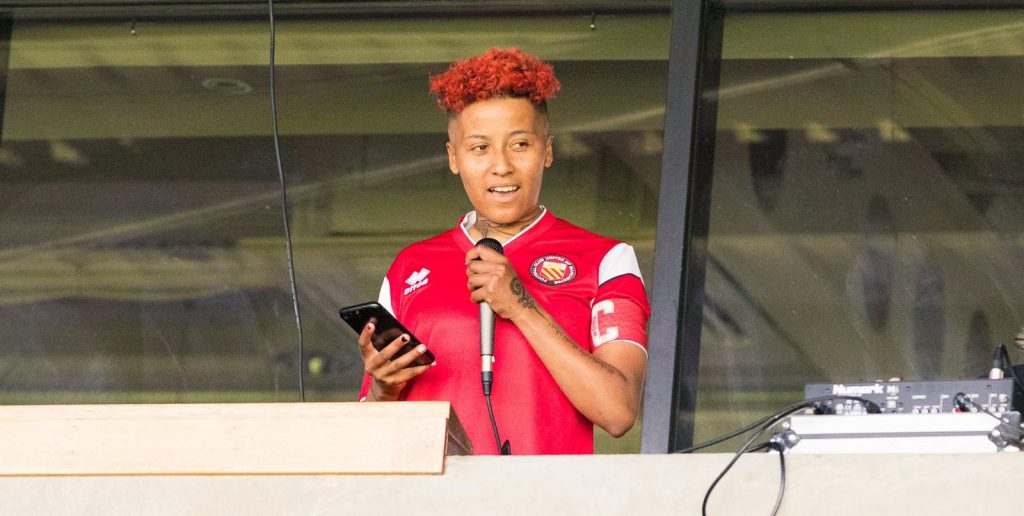
In the build-up to International Women’s Day back in March, midfielder Caz Fields received a request from a member of the media team at their club, FC United of Manchester.
The journalist was asking for a few quotes from the FCUM Women’s team’s vice-captain to feature in a website article. Caz messaged back…
“I replied and said yes, before adding, ‘by the way, I’m non-binary – would you still like me to be involved?'”
Caz told this story during a Football v Homophobia Youth Panel event that was held later that same month, to mark the annual Football v Transphobia Week of Action.
The club journalist’s response to Caz’s question was: ‘Of course!’ Their contribution ran in the article, as they described growing up in the women’s game and the importance of allyship…
I’ve played for FC United for the past four years now. It’s been one of the best club environments I’ve been at. Especially in a women’s team, the togetherness and friendship within a squad is special.
It was so encouraging to learn about Caz’s positive experiences, both from the article and in the FvH YP event. So with the 10th annual International Non-Binary People’s Day happening on July 14, 2021 (the first was back in 2012; the date marks the exact point between International Women’s Day and International Men’s Day in the calendar), we thought it was the perfect time to learn more about their journey in football.
And we’re delighted to say that Caz agreed to our media request too! They’re currently preparing for the 2021/22 season, which will see FCUM play at the fourth tier of the women’s game in England for the first time in their history, following constitution changes made last month.
The club is one of 13 in the FA Women’s National League Division 1 North…
We caught up via Zoom with defensive midfielder Caz – and briefly, their dog Luna too – at home in Oldham…
JH: Hi Caz! Thanks so much for chatting to us at Sports Media LGBT+. You must be excited about the upcoming campaign, particularly with the likes of Leeds and Newcastle in your league…
CF: Yeah, there are a few clubs that are quite far away! The previous league was fairly local but we’ll now get to stretch our legs and go to different parts of the country, which is good. We can’t wait to get started – the fixtures are due out this week.
We first learned about your story through the FvH YP event. How did you get involved in that?
I’m on TikTok, and Holly Grimes – the Youth Panel events officer – had liked a few of my videos on there [check out Caz’s inspirational speech for Black History Month from last October, below], and I have my Instagram attached. I got a message through that inviting me to take part in the panel event.
I’d never spoken on a panel or anything like that before. I only came out as non-binary about a year ago, so I was thinking ‘do I know enough to be on a panel and talk about it?’
But I suppose it’s just about sharing your own experience, isn’t it? It was really good to talk to different people and I learned stuff I didn’t know, even about myself, just through chatting to them about being out.
You mentioned when you came out as non-binary in 2020. How did that go?
It was during the first lockdown, and I think what sparked it was a combination of being sat at home and self-reflecting. Also, TikTok blew up massively at that time – that was all people could do! I was flicking through videos and I started seeing ‘non-binary’ cropping up, and I thought about how the word related to me a lot.
I’ve never felt like a girl but also I never really had the education to know what else was out there. If I’m honest, I was probably a bit ignorant – I was already gay but I didn’t know there were all these words and definitions for different feelings that you might have.
So I went away and researched what I’d read on TikTok and I realised that this word non-binary describes me down to a T.
Social media gets a pretty bad rap these days but your story is a reminder of what a useful, empowering place it can be too…
Yeah, it gets a lot of negativity but it’s probably the best platform to speak to people and educate those who otherwise wouldn’t know about all this. I thought I was quite educated but I clearly wasn’t, and I learned so much just from seeing a few videos. It made me want to then speak about it too through my own platforms. There might be a kid who just like me doesn’t have a clue but who then sees one video and it educates them. It’s a great tool.
Football and sport tend to be very binary. Do you feel it’s tough to navigate for someone who’s non-binary, especially if they’re being put into one of two boxes?
It is quite tough. If you’re already within a team, it might be easier to manage because they know you as a person, and it feels like a family when you talk to them. Also, coaches can change their language so it’s not as gendered in training sessions.
The hardest part is probably when you go into a game and the opposition don’t know – little words will crop up every now and then. For certain people who are non-binary, that might not be that big of a deal but for some others, being misgendered can really affect them and their sense of identity.
It’s been a transition to understand that myself – and not everyone is going to understand, because ultimately I am in a women’s team. From my point of view, I know it’ll be difficult for those people to accept and that it’s a fairly new thing, what with social media and the way people are still just learning about non-binary and what it actually means.
It’s small positive steps. In 10 years’ time, these things will have changed even more; for now, it’s about those little wins.
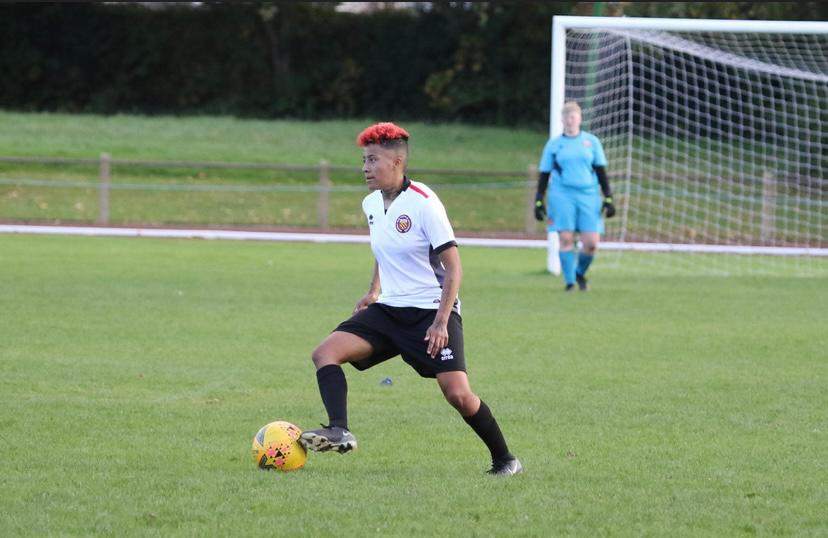
Would growing up have been easier if you’d understood earlier about that part of who you are?
When I look back, there were a lot of years of not unhappiness, but that sense of being lost – a sense of not really understanding. Things like in P.E., in Years 6 and 7, when I went with the boys because I knew I didn’t fit in with the girls.
As you get older, gender roles become quite strict in our society. You have to fall into one of two categories. I knew that neither category really worked for me, but it was hard to understand that in myself – and to then try to express that to other people was even tougher. So growing up was confusing, looking back. At the time though, it’s just what you know, when you’re developing as a person.
You mentioned how you came out as gay before you came out as non-binary. There’s a lot said nowadays about distinctions between sexual orientation and gender identity. But at such a young age, when you’re learning about yourself, it doesn’t all fall neatly into place, does it?
Yeah, it’s made out to be very black and white. Across the sexuality spectrum, it’s hard to explain that people can be bi, or pansexual – at that young age, it’s kind of gay or straight, and they’re the two boxes. When you’re younger, it’s more a case of picking the thing that’s closest to you but it might not exactly define you.
It’s a confusing time, but I feel there are hundreds of thousands of people across the world who go through that as kids! As you grow up, you learn to express yourself and it’s good to find labels that fit you.
I feel you have to go through those processes to understand who you are, at the end. I still identify as gay – that suits me more – but I didn’t even realise there was that distinction between my sexuality and my gender until last year.
I was reading about your football career, and how you went on a pre-season tour with senior Man City players when you were just 17 and part of their Development Squad. That must have been so exciting. Did professional football spaces feel very inclusive at that time or were you slightly concerned about opening up?
It was strange because I came out at the age of 11 or 12, but it wasn’t until I started playing football properly at Man City that I was in a team or environment where the majority of the players were gay. It was like being straight was the minority, which I’d never seen before because I’d been to a school where all of my friends were straight.
When I joined City, there were players a lot older than me who understood themselves a lot more than I did at my age. It was just good to be in an environment where you felt like you fitted in as a person. It massively helped in my growth as a person, who I felt I was, to be around people who were gay and were open about it as well. It was an amazing experience, regardless of sexuality, but I think that made me feel more comfortable, being in a team environment, and thinking there are people who look like me, act like me, and are very happy in who they are.
You joined FCUM in 2017 and you’ve risen up within the team now to the position of vice-captain. It sounds like everyone at the club really gets what inclusion means…
Yeah, I feel that across the board, it’s very inclusive, very open. It’s always been like a family environment, and there’s a few fans who are gay and trans too, so acceptance is there right across the board, whoever wants to be involved.
That might be a bit rarer in men’s football because there is still this stigma around sexuality. But it’s amazing to be at a club where it doesn’t matter about your gender, sexuality, or gender identity.
As a city, Manchester always appears to be a progressive and open-minded place. Have you had any experiences in football in which you’ve felt uncomfortable or awkward?
When I’m on the pitch, I’m very focused on the task at hand. There may have been things that have cropped up that I’ve not even noticed. Being vice-captain and taking on more of a leadership role on the pitch, I feel it’s almost my job to hold my head up and forget about things that may happen, on or off the pitch.
Thinking back, there’s never been anything that sticks out as having made me uncomfortable. That’s a good thing and I feel lucky I’ve had good experiences at all the clubs I’ve been at. Women’s football does seem more inclusive – being gay is more accepted than it is in men’s. I’m grateful for that.
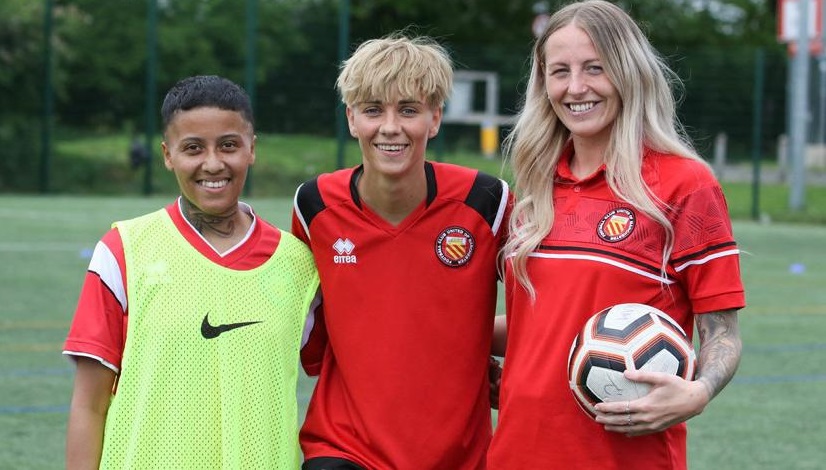
In the FvH YP event, you described coming out as non-binary to your team-mates by placing a message in the WhatsApp team group chat – and how you then threw your phone across the room so as not to see the reactions! Can you fill us in on the whole story?
Sure! One of my best friends is our captain, Kirsty Chambers. A few weeks prior, Kirsty and I had gone out on a walk during lockdown and I just said to her about being non-binary – I didn’t know what it meant at that point. I was really just wanting to express myself and tell someone how I was feeling.
She looked at me and said, ‘I’ve never seen you as a boy or a girl either. I’ve just always known you as Caz’. And that was the moment when I thought, ‘maybe it’s not crazy…’ Because I’d been worried that I’d been spending too much time in my house locked up!
But then I thought, maybe this is something I should come out with to the team. The biggest part of my life at the moment is football, so why would I not share that with them? That was almost the build-up, but it still took a few weeks for me to put the message into the group chat.
I was so nervous and I didn’t know how people were going to react. It’s something that people aren’t as clued up on so I wasn’t sure if they would find it strange. I suppose it helps that I’d been at the club for a while and everyone just knows me as Caz.
So when I did post it, I was so scared and I didn’t want to look at the replies. Later, I did, and everyone was like, ‘oh yeah that’s fine’, or ‘that’s no problem’ and ‘what do we refer to you as?’ It was such a great feeling to be accepted and included.
There is that fear for many people when you do come out, whether it’s sexuality or gender identity, that there’s going to be negativity surrounding it. So to have everyone in the chat reply and to be completely fine, and to change my pronouns straight away, it was really good.
As a vice-captain, you’re in a position where players will likely come to you for advice – and here you are speaking to your captain first about this. Kirsty’s positive reaction must have given you a lot of confidence?
Massively. From a best friend point of view, it was great acceptance. But that was what pushed me to tell the rest of the team as well. I thought, this is our captain, she’s such a leader, and I like to think that I take on a leadership role as well. If this person is accepting of it, I should be able to tell the other people I play on a pitch with week in, week out. It gave me courage. I’m glad I did it. I don’t think you can rush these things – you have to do it when you feel 100% confident. But it all came at the right time for me.
When you then came back together as a group, for training and matches, I’m guessing you were very patient because not everyone was going to get your pronouns right all the time. How did you all learn together?
You’re right, you can’t expect everybody to get it perfect overnight. It’s a fairly new concept for most people. But in our team, we’re very open and jokey with each other. If someone did get it wrong, it wasn’t anything serious – they’d say sorry, we’d smile, and move on.
It took me a while myself to get my own pronouns right – I wasn’t educated on what it meant, I just knew it’s how I felt. Having lived the majority of my life identifying as a girl and as a woman, I still found it difficult at first to refer to myself in a non-binary way and that’s been a process as well.
But when other people refer to you how you want to be referred to, it helps you address it within yourself. It’s kind of been a group thing with friends and family – a process we’ve all been through together. Now it feels like people pick up on it straight away.
When a person in a workplace or a team comes out as non-binary, sometimes other people around them get this feeling of having to be really careful and that they mustn’t make mistakes. It makes them anxious – that fear of getting things wrong. But you’re very clear about wanting to bring people like that with you…
Yeah, there are lots of people on our team who I’m friends with outside. One specifically is Ella Hartley – she joined us last season but we’re close friends from when I was at Man Utd [Caz was in their Centre of Excellence from ages 13 to 17]. Ella said she’d learned so much because she’d never met anyone who’s non-binary before. I think there’s almost an alienation, that people think that it’s something so far from what they know – but when it’s someone who’s actually friends with you, that helps of course.
Ella’s said to me, even in the last few weeks, that she’s still learning about pronouns and gender – and that’s good. I don’t see the point in hammering people and getting on their back if they get something wrong. That’s not the way people are going to become inclusive. That comes from having a laugh, joking, and educating people in a less serious way where they’re going to get on board a little bit more. That’s the approach I like to take.
And how was it with management? [The FCUM Women’s team were managed last season by Kamran Hussain; Tom Fitton has recently been appointed as his successor]
Outside of football, Kam and I were good friends anyway. It’s strange with management – there’s almost a sense of ‘how are they going to take it, is it going to impact anything?’ Those thoughts do go through your head, about performance and squad selection. But honestly, across the whole staff, it was completely accepting. I’m very grateful for that and I feel very lucky, because I know other people might not have had that same experience.
As for Tom coming in, I’ve known him for quite a few years – a lot of us players do. It’ll be a great appointment and I know he’s a very inclusive and accepting person too.
In the FvH YP event with Sam Bailey from Charlton Invicta and Sammy Walker, who are both trans, you all spoke about how misgendering is tough on your mental health. Does that get easier over time?
It’s hard. When you’re out in public – and it’s easy for this to happen if you’re in a group – the person serving you might say, ‘this way, ladies’ or ‘come with me, girls’. It’s those small things that make you question yourself.
There’s a thing too around non-binary, that you’ve got to look a certain way and that if you don’t, are you really non-binary? That’s been a journey for me as well. I may look more masculine one day, or more feminine, but that doesn’t take anything away from the fact that I’m still non-binary, despite the fact people may misgender me. That’s something I’ve had to work out in my own head. Even if I get my own pronouns wrong occasionally, it doesn’t take away who I identify as.
Have you sensed a change in yourself since coming out as non-binary? Do you feel more confident, including on the pitch?
It hasn’t affected my game, because I’ve always had this outgoing personality. But it has affected my confidence in that I feel more authentic and genuine around people, that I’m not hiding anything anymore. It’s hard to come to terms with the fact that I didn’t know what I was hiding! That was even more confusing.
Labels are a good thing because everyone needs to feel included and accepted. People might think there are ‘hundreds’ of labels now and that there never was before, but that’s because people are actually understanding there’s a lot more to gender and sexuality then just gay and straight, or just man and woman.
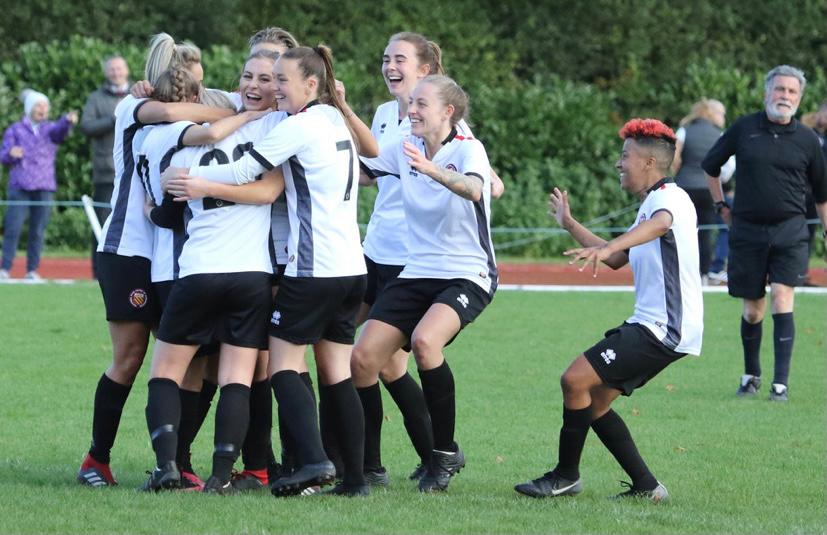
There are some fantastic resources out there, such as the document issued by LEAP Sports Scotland last year. How valuable is content like that?
The resources really help that education to reach a larger audience. I think the best way forward in sport is probably to have people who are out as non-binary and who understand what that means, as they can speak to people about it. Visibility alongside the resources is so important.
Were there non-binary people in sports, entertainment or other walks in life who you saw and were inspired by?
One of the first ones I learned about was Sam Smith. When it’s artists that you’re listening to and hearing on the radio on a daily basis, that’s really something. When they came out as non-binary, I was like ‘wow!’ It showed me you don’t have to look or act a certain way, and it isn’t just people who are famous, it’s everyone – a massive chunk of people who are coming to terms with who they are.
With this being International Non-Binary People’s Day, which helps to raise awareness in wider society, what would you most want people to take away from today?
I think I’d just say, ‘be open’ – learn about it, talk about it, even if you don’t understand. There are also going to be a few people at the complete opposite end of the spectrum who completely disagree with it and don’t accept it as valid. But when you become more open to educating yourself, it’s hard to disagree with all the resources and content out there, and most of all, the real-life experiences from people across the world describing who they are and how they feel.
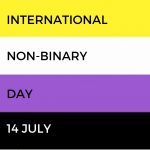
I get that it’s hard when you’ve only known a certain thing to then branch out and meet different people. But that’s the only way we’re going to learn. That includes myself – just because I’m part of the community myself doesn’t mean I know everything about it. Recognising that allowed me to learn so much more.
Have you met anyone else yet in football who’s non-binary and out?
I haven’t, not yet! But I’m sure there are people who are. From the top level, maybe it would take someone in men’s football – and I know it’s probably not going to happen, because there isn’t even an out gay man in the Premier League yet – but when that day does come when an athlete in men’s sport comes out as non-binary, that will reach such a large audience. It will filter down to every other sport and parts of the community. There are already so many people who are non-binary but in sport, it will take a person at the very top to open up that dialogue for those who don’t understand it or may not want to.
When the Canada international Quinn came out last year, they spoke about being trans and non-binary. How do you identify, because not everyone who’s non-binary would necessarily state they are trans as well?
I wasn’t aware when I first came out that non-binary was under the trans umbrella, when I first started researching about it – or even how sometimes gender doesn’t equate into pronouns. I do see myself as non-binary under the trans umbrella. I think that takes away a bit of the stigma, because it is a spectrum and it’s never as easy as black or white, that you’re trans or you’re not, that you’re non-binary or you’re not – it’s a spectrum.
So I would put myself under the umbrella, but I wouldn’t label myself as trans, because I wouldn’t want to take away from the experience of trans people. I want to respect that they go through bigger struggles. I’m careful not to step on people’s toes.
Joe White, an England fan who’s non-binary, received a welcoming message on Twitter from Jordan Henderson after they tweeted about attending the recent Germany game at Euro 2020. Henderson also had Rainbow Laces in his boots in several games and Harry Kane wore the rainbow armband at Wembley. What did you make of that inclusive energy around England at the Euros?
It did feel more inclusive – Manuel Neuer had the rainbow armband on in games and in his interviews too. In previous years, it may have been that the men’s game didn’t want to acknowledge Pride or anything like that because they knew they’d get a lot of backlash from people. But now it feels they understand there’s a bigger picture and purpose, to reach an audience and say, ‘we are inclusive’.
It’s great to see inclusion on TV too. There’s an amazing advert from Indeed at the moment about a job interview – the person going for the job is really nervous. They go in and the interviewer says he uses he/him pronouns and asks what the other person’s pronouns are. It’s so powerful and it opens the dialogue, such as for someone’s nan just sat on the couch at home! Representation across TV and media like that is really encouraging.
The Supreme Court in the UK is currently hearing a case against the government’s policy of not allowing ‘X’ markers in British passports. How much would it mean to you to have your passport say you’re non-binary?
I was having this conversation with someone the other day, about passports and forms. When I look at it, I know I have to tick ‘female’ but for those of us who are non-binary, every time you do, it’s a knock to your identity.
The government needs to realise there’s a sizeable group of people who are being excluded. It does hurt, it’s like we’re not being recognised as existing. If the government realised that, it would help to make society more inclusive. It’s one of those small minor changes and it’s not taking anything away from anyone who identifies as a man or a woman. It’s an add-on that includes everybody else. A passport is something simple that everyone should feel included on.
Manchester Laces is currently running a campaign urging the FA to look again at its trans inclusion policy for amateur clubs, because of the hormone readings that trans players have to submit in order to play in affiliated matches. What are your thoughts on that?
I feel the FA procedures are outdated – it’s almost as if you have to prove you are what you say you are before you’re allowed to be included. That’s not equality, that’s not inclusion.
I’d like to think that the way our club puts out content showing how inclusive we are, that there wouldn’t be as many difficulties – but I do understand the FA policies make it hard and they probably put a lot of people off. I bet there are talented people who could play at a higher level but because of the way they identify, they may think it’s not worth the risk, or the hassle of jumping over so many barriers just to play. I hope in the coming years, the FA can change those policies and make football more inclusive. At the moment, it’s a barrier to people who want to get involved.
You can learn more about the Manchester Laces campaign on their website.
Our thanks to Caz for taking part in this Q&A! Go follow them on social media at @CazSimone on TikTok, @_cazsimone on Instagram, and @CazSimone6 on Twitter. Thanks also to our friends on the Football v Homophobia Youth Panel.
Sports Media LGBT+ is a network, advocacy, and consultancy group that is helping to build a community of LGBT+ people and allies in sport. We’re also a digital publisher. Learn more about us here.
LGBT+ in sports? Your visibility will inspire other people – sharing your story can be hugely rewarding and you don’t have to be famous to make a positive and lasting impact. We encourage you to start a conversation with us, in confidence, and we’ll provide the best advice on navigating the media as part of your journey so that you retain control of your own narrative.
Email jon@sportsmedialgbt.com or send a message anonymously on our Curious Cat.


